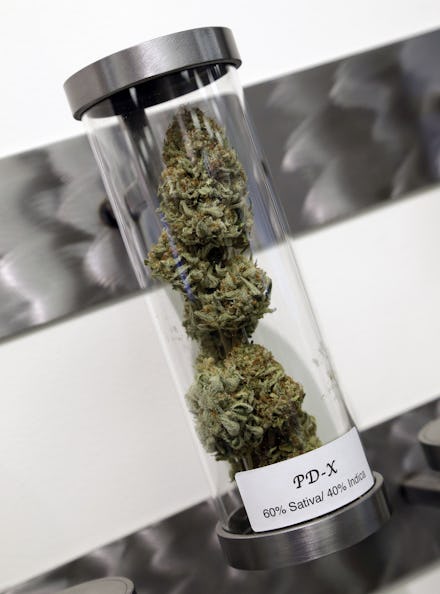The Government Has Finally Admitted That Marijuana Could Help Shrink Brain Tumors

Marijuana is classified as a Schedule I drug by the Drug Enforcement Administration. This places it in the class of drugs most strictly regulated by the federal government, and means it is considered to have no medicinal value for the public.
But the federal government has quietly admitted that marijuana may in fact serve as a useful treatment for treating one of the most aggressive forms of cancer.
The change: The National Institute on Drug Abuse has revised its stance on the medicinal value of marijuana by acknowledging a major study published in November by researchers at St. George's, University of London that found that the drug can have a "dramatic effect" on brain cancer.
The revised guidelines now state:
...recent animal studies have shown that marijuana can kill certain cancer cells and reduce the size of others. Evidence from one animal study suggests that extracts from whole-plant marijuana can shrink one of the most serious types of brain tumors. Research in mice showed that these extracts, when used with radiation, increased the cancer-killing effects of the radiation.
Wai Liu, one of the co-authors of the study, explained in an op-ed for the Washington Post in November that the research is "promising" and that "cannabinoids could play a role in treating one of the most aggressive cancers in adults."
The government's acknowledgement of the study bodes well for advocates for medical marijuana. The drug's Schedule I classification has stifled scientific inquiry into the effects of marijuana (both good and bad) and has resulted in a catch-22: Marijuana is labeled Schedule I because it's assumed to have no medicinal benefits, but precisely because it is labeled Schedule I, scientists generally cannot acquire funding to determine if it has any benefits.
Progress? The revised guidelines are in sync with a slow relaxing of the federal government's hard-line stance on the issue. In February, the new U.S. surgeon general struck an open-minded and gently optimistic tone when asked about medical uses in an interview.
"We have to see what the science tells us about the efficacy of marijuana," Dr. Vivek Murthy, the surgeon general of the U.S., said in an interview on CBS This Morning. "We have some preliminary data that for certain medical conditions and symptoms, marijuana can be helpful," he continued. "We have to use that data to drive policy-making."
Earlier this year, the American Academy of Pediatrics adjusted its official position on marijuana and called for the government to drop its Schedule I status in order to facilitate research on its effects.
A bill was recently introduced in the Senate by Sens. Cory Booker (D-N.J.), Rand Paul (R-Ky.) and Kirsten Gillibrand (D.-N.Y.) that would reclassify marijuana as a Schedule II drug to allow exploration of its medical benefits. If common sense prevails, it will make it into law.
h/t Raw Story